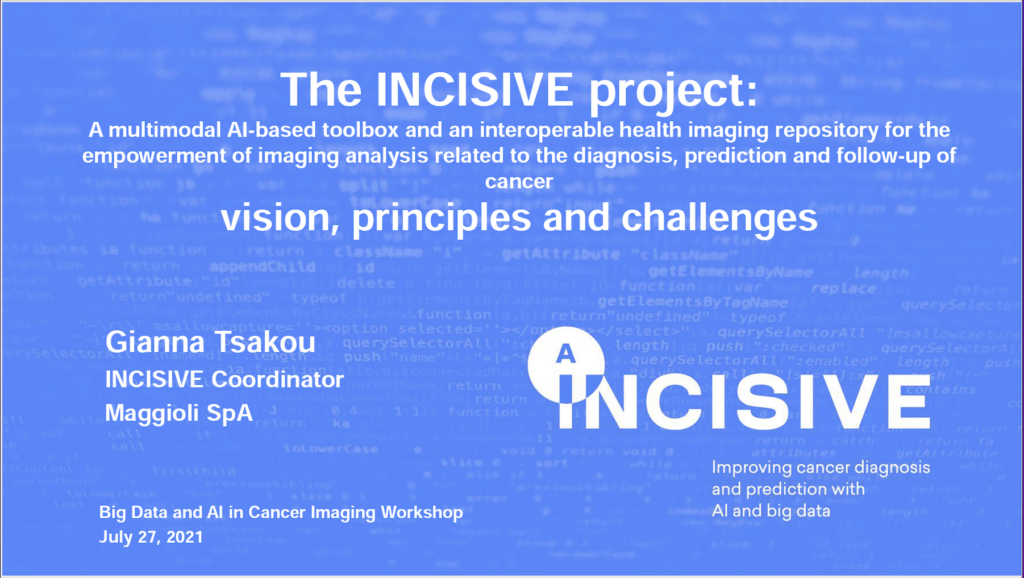03 Apr INCISIVE PROJECT
VISARIS CONTRIBUTES TO INTERNATIONAL SCIENTIFIC RESEARCH 
Santarcangelo di Romagna 5th January 2022. Visaris is a part of an international consortium engaged in a cutting-edge scientific research project, INCISIVE, coordinated by Maggioli SpA with 26 organizations from 9 different countries (Italy, Spain, Finland, Greece, Cyprus, Serbia, Belgium, United Kingdom, Luxembourg). INCISIVE is a 42-month project, funded by the EU under the Horizon 2020 Programme, specifically we are engaged in DT-TDS-05-2020, focusing on AI for Health Images. The project is exploring and supporting the potential of Artificial Intelligence (AI) tools for enhancing state-of-the-art health imaging solutions for four types of cancer: breast, colorectal, lung and prostate. INCISIVE is exploring the potential of AI tools by developing an AI-based toolbox consisting of novel AI models, combined with a set of predictive, descriptive and prescriptive analytics, that aim at improving the sensitivity and specificity of cancer imaging methods, thereby enabling better-informed decision-making by clinicians in charge of diagnosing and treating these four types of cancer. INCISIVE not only explores the potential of AI tools in health imaging but it is also supporting the potential of AI tools by developing an interoperable federated health imaging repository for the types of cancer that are part of the program. This repository will be used for training the AI models but will also be made available to the wider AI research community to facilitate further AI training and experimentation far beyond the project’s lifetime.
 INCISIVE aims to address three major open challenges in order to explore the full potential of AI solutions in cancer imaging: (1) AI challenges unique to medical imaging, (2) Image labelling and annotation and (3) Data availability and sharing. In order to do that INCISIVE will develop and validate: (1) an AI-based toolbox that enhances the accuracy, specificity, sensitivity, interpretability and cost-effectiveness of existing cancer imaging methods, (2) an automated-ML based annotation mechanism to rapidly produce training data for machine learning research and (3) a pan-European repository federated repository of medical images, that will enable the secure donation and sharing of data in compliance with ethical, legal and privacy demands, increasing accessibility to datasets and enabling experimentation of AI-based solutions.
INCISIVE aims to address three major open challenges in order to explore the full potential of AI solutions in cancer imaging: (1) AI challenges unique to medical imaging, (2) Image labelling and annotation and (3) Data availability and sharing. In order to do that INCISIVE will develop and validate: (1) an AI-based toolbox that enhances the accuracy, specificity, sensitivity, interpretability and cost-effectiveness of existing cancer imaging methods, (2) an automated-ML based annotation mechanism to rapidly produce training data for machine learning research and (3) a pan-European repository federated repository of medical images, that will enable the secure donation and sharing of data in compliance with ethical, legal and privacy demands, increasing accessibility to datasets and enabling experimentation of AI-based solutions.
 The INCISIVE models and analytics will utilize various cancer imaging scans, biological data and EHRs, and will be trained with 1 PB of available data provided by 8 partners within the project. INCISIVE solution will be investigated in three validation studies for Lung, Breast, Prostate and Colorectal Cancer, taking place in 8 sites, from 5 countries (Italy, Spain, Greece, Cyprus and Serbia), with participation of at least 2,600 patients and a total duration of 1,5 year. INCISIVE moves beyond the state of the art, by improving sensitivity and specificity of lower cost scanning methods, accurately predicting the tumor spread, evolution and relapse, enhancing interpretability of results and “democratizing” imaging data.
The INCISIVE models and analytics will utilize various cancer imaging scans, biological data and EHRs, and will be trained with 1 PB of available data provided by 8 partners within the project. INCISIVE solution will be investigated in three validation studies for Lung, Breast, Prostate and Colorectal Cancer, taking place in 8 sites, from 5 countries (Italy, Spain, Greece, Cyprus and Serbia), with participation of at least 2,600 patients and a total duration of 1,5 year. INCISIVE moves beyond the state of the art, by improving sensitivity and specificity of lower cost scanning methods, accurately predicting the tumor spread, evolution and relapse, enhancing interpretability of results and “democratizing” imaging data.




